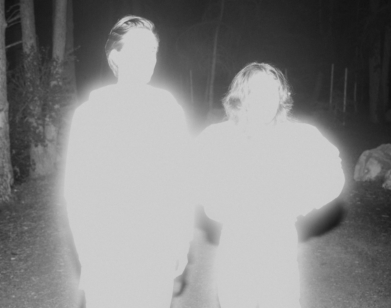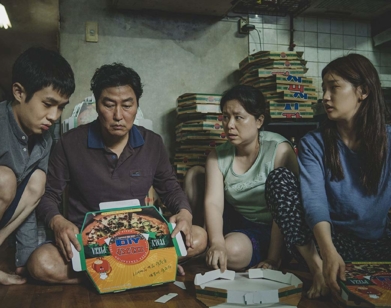In Snowpiercer, Daveed DiggsAdds Kicking Ass to His Repertoire

It’s become a cliché to talk about everything Daveed Diggs is good at. His arsenal of skills—from singing, to rapping, to acting—have made him a lethal performer. And this Sunday, the Oakland native will stretch his versatility one step further by adding action star to his resume, as one of the leads of TNT’s dystopian thriller, Snowpiercer. Adapted from the 2013 Bong Joon Ho movie of the same name, the series is set on Earth after an attempt to stop climate change catastrophically backfired, leaving the planet freezer burned. The only humans left are those who live aboard a train that circles the frozen globe, its 1,000 cars divided by class. Diggs plays Andre Layton, an ex-detective who becomes instrumental in a brewing uprising in the lower class, while trying to solve a murder mystery in the upper cars. For Diggs, the grueling day-to-day schedule of shooting a television show reminded him of his days on Broadway, when the now 38-year-old performer played Thomas Jefferson and Marquis de Lafayette in the original production of Hamilton, roles that won him a Tony and Grammy award. We spoke to Diggs about the difference between taking a beating and giving one (on film), how life changed after Hamilton, and what it takes to risk it all for the sake of art.
–––BEN BARNA
–––
SHANTI ESCALANTE: Snowpiercer has been in the works for a while. When did you know you were going to be on the show?
DAVEED DIGGS: Pretty early on. I was one of the earlier people cast, so I’ve been looking forward to this for a while.
ESCALANTE: What attracted you to the role?
DIGGS: I read the pilot first before I watched the film, and then eventually I read the graphic novels and got even more excited. There’s a lot of different ways to go and so many different stories to tell, and that’s what felt exciting to me. Andre Layton is complicated. He’s damaged but means well, and he’s also a detective. I’m obsessed with detective fiction, so that was an added bonus.
ESCALANTE: It’s been really interesting to see a show dealing with class and race and how that’s going to intersect with climate change.
DIGGS: One of the things I’ve grown to really appreciate about the show is that it’s not in the business of denying anything. All the real discussions we’re having in our current life are being played out in the microcosm of this train. There’s also so much plot. So much happens in every episode, so to be able to have that and not shy away from the complexity of these discussions is a difficult balancing act for the writers. I think sometimes you sacrifice complexity in order to have clarity of action, and this show didn’t do that.
ESCALANTE: This is your first kind of starring role on television. How does that change the work you do?
DIGGS: It’s a different grind. It’s the closest thing that’s not a play that gets to you on that same kind of Broadway schedule, where you’re there so much. I’ve deepened my work for a second season. My process is very different than it was when I started. I’m more aware of how much of my work I can bring home with me, and at what point that becomes detrimental. You really do live in this place for five or six months when we’re doing it, so it becomes as much about managing your time away as it does your time there.
ESCALANTE: I recently spoke to Sonoya Mizuno, who spoke about the emotional weight of dealing with characters who are going through painful things, and learning how to manage that.
DIGGS: When you’re doing a play, you tell the whole story. It’s relatively easy to just walk away from that at the end of the day and gear up to do it again the next day. With a film, when you’re done, you’re done. But with TV, if your character’s going through a stretch of hardship, it’s going to be hard for a long time.
ESCALANTE: By “walk away,” do you mean cutting ties from the work that you’ve done to get close to the character?
DIGGS: Yeah, the emotional or physical lifting that you have to do on a set. I was really excited to be in a show that had a lot of action in it. I’d never done that before. We were shooting all the fighting for this one episode. It’s incredibly bloody, and we were working in this hyper-violent atmosphere for two weeks. After three days in it, I hated it. I was really sick of hurting people, even though we were acting. I had a realization that I’d so much rather get beat up than beat somebody else up.
ESCALANTE: How do you feel about Snowpiercer being released in this moment?
DIGGS: We’ll see how people respond to it. It felt particularly relevant when I read the script four years ago. As good sci-fi does, it’s examining systems that we’re participating in currently, so it was always going to feel relevant. There was no way to predict that it would be coming out in the midst of this pandemic, so I’m certainly curious. I know for me there’s an element of longing in the show that feels more pronounced than it did at other times.
ESCALANTE: How do you manage being so interdisciplinary?
DIGGS: I’ve been making music at least as long if not longer than I’ve been acting. And I’ve been writing. Me and my group of artist friends, we’re producing plays and movies and web series and things like that for many, many years before anyone cared. I think one of the benefits of a critical mass of people learning who I was via Hamilton was that the role was written by my friend who was aware of all of my varied skill sets. By virtue of being introduced to a larger audience in a thing that was kind of interdisciplinary, it’s opened doors instead of closing them. You just never know what’s going to get your name out there, and sometimes when folks get their name out there like on a sitcom, let’s say, they have a hard time branching out because there’s an industry that’s looking at you for this thing, so those are the offers that you’re getting. But I immediately started getting offers to sing songs or to write music or to do comedy or to do drama.
ESCALANTE: How has your life changed since Hamilton?
DIGGS: I’m financially way more comfortable, but other than that, I work with the same people. I still find myself having a diverse array of projects around me, and now I have a lot more help with how to get ideas out there. Between my team that’s working with me and also just being in the industry longer, I have more connections and more people to go to, and I’m able to connect friends with great ideas to other creatives who can help those ideas get out, or help shepherd an idea through the process myself. That’s been really gratifying and sort of a new hat to wear.
ESCALANTE: What are you reading right now?
DIGGS: Mostly, I read sci-fi and mystery stuff. I’ve been obsessed with N.K. Jemisin for a long time, and I’ve had the good fortune getting to sort of work with her peripherally on some things, which has been awesome.
ESCALANTE: I’ve actually just finished reading a ton of Ursula Le Guin.
DIGGS: Oh, man. Ursula’s the GOAT.
ESCALANTE: She’s such a hero.
DIGGS: She is. I mean, arguably the best that ever did it. My band’s album, Splendor and Misery, it’s sort of a composed, afro-futurist rap opera, but borrows a lot. It was a way to pay homage to all of the different sci-fi traditions that we love, and there’s a ton of Ursula references in there, and a lot of N.K. Jemisin references in there. We actually name-dropped characters of hers over the course of the album.
ESCALANTE: When did you know that you wanted to be an artist?
DIGGS: I think it’s more like I lost the capability to do anything else. I pursued these things for so long, but I just never knew really what that meant until pretty recently. I’m fortunate enough to be able to cobble together rent and food money doing it, and when you’re younger, that’s kind of as much as you need. I could have made more money doing something I didn’t enjoy, or I could have made enough money doing a thing that I did enjoy. I chose the latter, and because of that I’m not a particularly useful person outside of that. I’m not good at building IKEA furniture.
ESCALANTE: I’m actually about to graduate from school, and I’ve been thinking, “Damn. I might not have any skills.”
DIGGS: It becomes a game of what are the different things that use skills that you do have. A friend of mine started working in the advertising department of Pandora, and for a while she saved my life by just throwing me voiceover commercial work. That was a gig I never thought I’d have. I got to do all those commercials to buy premium or whatever. I must have been a pretty hated person because my voice was always interrupting whatever you were listening to.
ESCALANTE: Do you have any advice for people who are planning on pursuing art professionally?
DIGGS: I think you have to make choices about what your needs are. I realized pretty early on that I needed a certain degree of creative fulfillment in my life. I was not happy and also not functional without it. I was the worst person in the world, so that led me to trying to figure out how to maximize the amount of time I could spend on art with the minimum amount of income. You end up having to make sacrifices. Where you live might not be where you wanted to live. Having a community of other artists around you has been really helpful. Getting to create things with people and then pooling our limited resources in order to make something happen all became part of the hustle because everyone was in the same boat of, “All right. We have to eat, and we have to pay this rent, but also we’ve got to make this silly sci-fi web series. Who’s working at a college that will give us food from their dining hall? What can we panhandle? How much change is in the couch cushion?”




